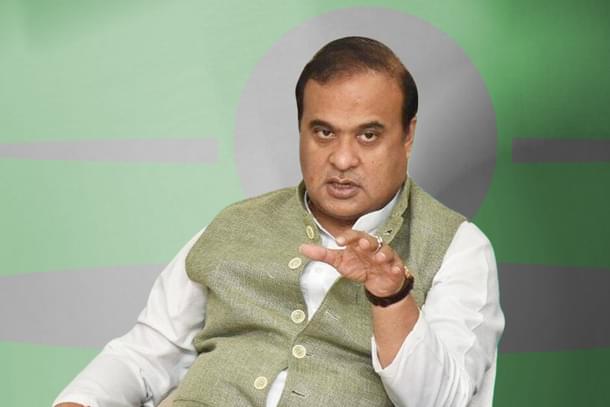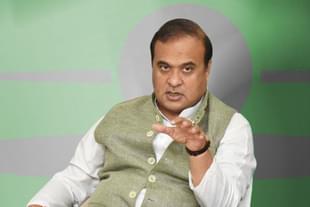North East
Here’s How The Himanta Biswa Sarma Government In Assam Is Securing The Rights Of State’s Indigenous People
Jaideep Mazumdar
Jan 04, 2024, 09:01 AM | Updated 09:01 AM IST
Save & read from anywhere!
Bookmark stories for easy access on any device or the Swarajya app.


The Memorandum of Settlement (MoS) signed by the Union and Assam governments with the pro-talks faction of the United Liberation Front of Asom (ULFA) last week has been hailed as a major step towards ringing in lasting peace in the North East.
But the accord holds a far greater significance: it is a continuum of the present state government’s resolve to secure political and socio-economic rights of Assam’s indigenous people.
Chief Minister Himanta Biswa Sarma has been crafting measures to arrest and reverse the political dominance of the Bangladesh-origin Muslims, almost all of them illegal migrants (from erstwhile East Pakistan and Bangladesh) or their progeny, who have swamped vast swathes of Assam.
From being just about 12 per cent of Assam’s population in 1951, the non-indigenous Bengali-speaking Muslims of Assam now constitute an estimated 36 per cent of the state’s population.
Unchecked illegal influx through the porous India-Bangladesh border has caused a major demographic imbalance in the state.
Previous governments in the state were seen as encouraging this influx and according protection to the illegal migrants who became valuable vote banks.
Delimitation Of Assembly Constituencies
At the request of the state government, the Election Commission of India (ECI) conducted an important delimitation exercise in Assam to redraw the boundaries of the 126 assembly constituencies in the state last year.
The final report of the ECI-conducted delimitation exercise was published in August last year. A close study of the report reveals that the boundaries of many constituencies where Bengali-speaking Muslims played a decisive role in elections have been extensively redrawn.
Since Bengali-speaking Muslims are reported to vote en masse (their voting preferences are mostly dictated by their religious leaders), they play a decisive role in all constituencies where they form 25 per cent or more of the electorate.
Bengali-speaking Muslims are in an absolute majority in 12 out of Assam’s 32 districts and constitute between 22 per cent and 40 per cent of the population in another five districts.
As such, the electoral outcomes in at least 35 of the 126 assembly seats in the state used to be decided by these illegal Muslim migrants or their descendants.
This has now been reversed and post-delimitation, Bengali-speaking Muslims are in a decisive position in only 24 assembly constituencies.
Also, some constituencies where the Bengali-speaking Muslims are present in large numbers have been reserved for Scheduled Tribes (STs) and Scheduled Castes (SCs), thus denying the illegal migrants a chance to exert themselves politically.
Nine assembly seats have been reserved for SCs and 19 for STs.
The MoS with the ULFA says that the process of granting ST status to six indigenous communities of the state (Tai Ahom, Koch-Rajbongshi, Chutia, Moran, Mottock and tea tribes) will be expedited.
Once this happens, more assembly seats will be reserved for these communities. And that will curb the political influence of the Bengali-speaking Muslims even more.
Not just assembly seats, the delimitation exercise has curbed the political influence of the illegal immigrants and their descendants even in Lok Sabha seats.
Bengali-speaking Muslims have been winning two Lok Sabha seats from Assam — Dhubri and Barpeta. The redrawing of the boundaries of Barpeta Lok Sabha constituency has ensured the marginalisation of the political influence of the illegal migrants in this seat.
Bengali-speaking Muslims can, from now on, win only the Dhubri Lok Sabha seat (just one of the 14 Lok Sabha seats in Assam) where they form a majority of the electorate.
Securing Land Rights Of Indigenous Communities
Assam has many laws that protect the land rights of indigenous communities. But under previous governments, these laws were watered down or violated, and the state authorities did nothing to enforce them.
As a result, vast swathes of even tribal areas of the state were illegally acquired by Bengali-speaking Muslims.
After coming to power in 2016, the BJP-led coalition government started enforcing the laws strictly. This exercise received a further boost after Himanta Biswa Sarma became the Chief Minister in 2021.
Illegal settlers were evicted from tribal belts and forests, and land parcels under the illegal ownership of ‘outsiders’ (the illegal immigrants or their descendants) were restored to their original owners.
Sarma also enacted legislation to declare more areas in the state as reserved exclusively for indigenous communities, especially the state’s tribal communities, and making ownership of land in such areas by non-indigenous communities illegal.
The MoS with the ULFA states that this process will be strengthened and ownership of land in more areas of the state will be reserved for indigenous communities. Assam’s ‘indigenous communities’, it must be emphasised, includes Assamese-speaking Muslims.
Socio-Economic Survey Of Indigenous Muslim Communities
Chief Minister Sarma had, in October last year, announced a comprehensive socio-economic survey of the five indigenous Muslims communities of Assam — the Goria, Moria, Deshi, Syed and Jolha communities.
This is another significant step to secure the rights of the indigenous communities of Assam. Bengali-speaking non-indigenous Muslims, who vastly outnumber the indigenous Muslims of the state, have cornered all benefits meant for minorities.
The socio-economic survey of the indigenous Muslims will enable the state government to secure their rights and, if necessary, enact rules that will entitle them to at least a lion’s share of the benefits meant for minorities.
A Few More Measures
Reversing radicalisation of illegal Muslim immigrants: The Assam government has taken many measures to prevent radicalisation of the illegal migrants (or their descendants) and take them out of the influence of Islamist mullahs.
Unregistered madrassas have been shut down and the registered ones are being converted into regular schools.
Clerics in mosques will have to register themselves with the local authorities, including the police, and a strict watch is being kept on their sermons and activities.
Banning polygamy: Chief Minister Sarma said he will introduce a Bill in the state assembly in February this year to ban polygamy. The bill will criminalise the practice which is widely prevalent among Bengali-speaking Muslims of Assam.
The proposed bill will also have some provisions to stop the practice of ‘love jihad’ which is registering an increase in the state.
The ‘culprits’ here are Bengali-speaking Muslims who have been targeting girls belonging to indigenous communities, especially poor tribals.
Two-child norm: Assam has already started implementing the two-child norm for families wishing to avail government benefits.
Bengali-speaking Muslims are, once again, the biggest violators here and according to estimates, the average size of a Bengali-speaking Muslim family is six.
The move is aimed at stemming the rapid rise in population of Bengali-speaking Muslims in Assam.
Uniform Civil Code (UCC): Sarma has declared his intent to promulgate UCC in Assam this year.
Safeguarding and promoting cultural rights of indigenous communities: The MoS with ULFA also lays stress on this. While the state government has already implemented a number of measures in this regard, Chief Minister Sarma reiterated on Monday (1 January) that promotion of the culture and traditions of indigenous Assamese and according primacy in all respects of indigenous cultures will be a prime objective of his government from now on.
A fresh NRC: The exercise to update the National Register of Citizens (NRC) was highly flawed — riddled with corruption and anomalies, it was biased in favour of Bengali-speaking Muslims.
That’s because the rules governing the exercise were framed by the earlier Tarun Gogoi-led Congress government in Assam which allegedly wanted to protect the illegal immigrants.
When the final NRC was published, most Bengali-speaking Muslims who (or whose parents and grandparents) had infiltrated into Assam from Bangladesh (or erstwhile East Pakistan) found their names in the updated NRC. The whole exercise was thus rendered pointless and its very purpose was defeated.
Pleas to conduct a re-verification of the NRC are pending before the Supreme Court. The state government has backed those pleas and Chief Minister Sarma has promised that it is only a matter of time before a fresh and flawless exercise to update the NRC is undertaken.
These measures, which are worthy of emulation by states like Bengal which are plagued with infestation by illegal immigrants from Bangladesh, will also discourage further illegal infiltration from Bangladesh into Assam.





